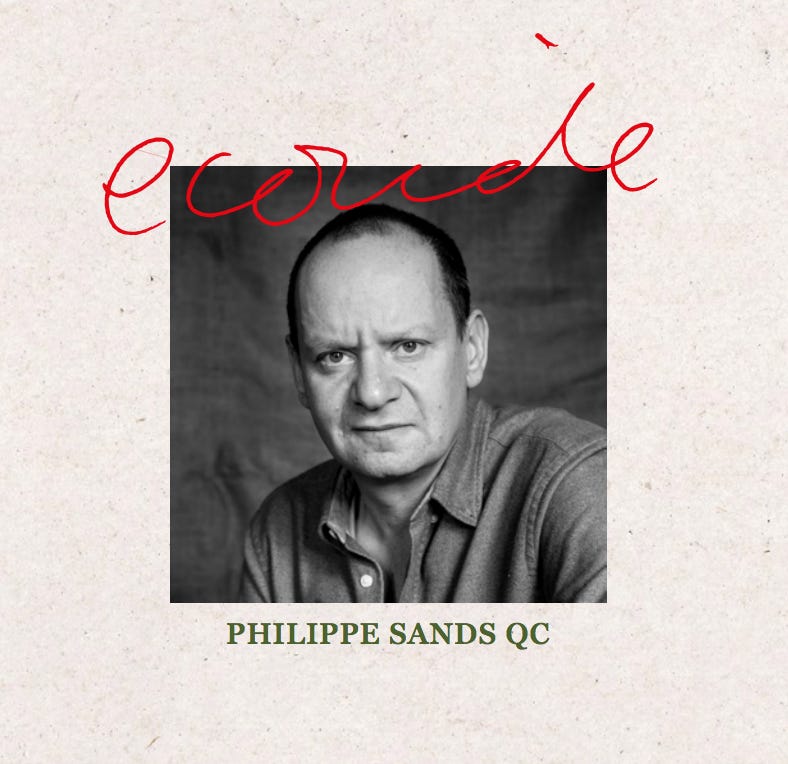Criminalising ecocide: interview with Philippe Sands
Ours to Save speaks to the barrister and author of East West Street about why ecocide should sit alongside war crimes and genocide as an international crime.
Last week saw a historic moment for the law. The Rome Statute of the International Criminal Court currently lists four crimes: genocide, crimes against humanity, war crimes, and crimes of aggression. On Tuesday 22nd June, a definition for a fifth – ecocide – was unveiled.
Right now mass deforestation, oil spills, industrial farming and destructive mineral extraction go all but unpunished. Making ecocide an international offence would allow for the arrest and punishment of perpetrators. Needless to say, a law against ecocide would be instrumental in fighting climate change.
The definition was commissioned by the Stop Ecocide Foundation, and took a panel of 12 legal experts from around the globe six months to come up with.
We spoke to Philippe Sands who, alongside Senegalese jurist Dior Fall Sow, chaired the panel of lawyers. Sands talked to Ours to Save about the late Polly Higgins, how the law can change consciousness, and the long road to getting the definition recognised.
Why do you feel the ecocide should sit alongside crimes against humanity, genocide, and so on?
There have been no new international crimes for 75 years. At the time [the Rome Statute was developed], in 1945, laws against genocide, crimes against humanity, crimes of aggression dealt with immediate needs. The environment was not part of the constellation of things people cared about at that time.
75 years on this planet later, and it's plain that something big is happening with the environment – something that is extremely concerning.
The law needs to play a role, as one of the instruments at our disposal in dealing with climate change.
There's politics, there's economics, there's diplomacy, there's social media, and other ways of engaging with environmental challenges. But the law, too, has a role – and there’s a gap.
My hope for this definition is that it contributes to a change of consciousness. I'm not starry-eyed about how the law can sort things out. A genocide law did not stop genocide from happening, and an ecocide law won't stop terrible damage to the environment. But it provides a wake up call and an instrument, which says: there are certain things that you can't do, and damage to the environment is one of them.
It's time to change; it's time to take a less anthropocentric view of things, and protect the environment as an end in itself.
Is there any precedent for a law against ecocide? I know in parts of South America they have protection of the environment as an independent being. Is that anything like what you’re trying to set up?
At the national level, some constitutions have the protection and wellbeing of the environment and ecosystems built into the constitutional legal order.
Then you've got a lot of international conventions on the protection of the environment, some of which call on states to criminalise environmental harm at the national level.
The only existing international crime you have, in relation to the environment, is that using the environment as a means of war is prohibited.
So we've drawn on that and basically extended it into all times, including peace. It's essentially considered an extension of an existing prohibition in terms of war at all times, and in relation to a wider sort of environmental resources. It’s concentrated on climate change and serious threats to biodiversity.
Were there any particular points of contention when settling on the definition?
It was a diverse group; I was one of 12 people, of all genders and orientations and colours and parts of the world and backgrounds.
Inevitably, when you bring 12 people together like that, it's not like the old-style groups in the ’40s where everyone was much of a muchness. Take the photograph of who drafted in ‘45 – it’s 12 white men, basically from Europe and the United States. It’s different, and that was interesting.
When you get some people who have spent their lives as environmental activists on the one end of the spectrum, and others who spent their lives perhaps as a US federal prosecutor on the other end of the spectrum, you’re going to get a range of views – on where you set the bar, or how you define the environment and the terms of the protection.
What makes me really happy, actually, is that it is a consensus document. All 12 people signed off on it. No one got everything they wanted. No one got nothing they wanted. No one didn't get something they wanted. We’ve tried to meld together the best of views.
I think the central challenge was to come up with something that was meaningful, but would not scare governments.
At the end of the day, governments are going to have to run with the idea. If governments don't run with it, nothing will happen.
Will the work of the 12 of you continue past setting the definition? Are you going to play an active part in speaking to governments?
That I don't know. We have before. The definition was launched on Tuesday, and a meeting was set with interested governments the previous week. We thought six or seven would turn up, but 14 turned up. I was encouraged by that. And they were pretty positive in the sense that they weren't very negative!
If people aren't trashing it and complaining and bellyaching, that's a good thing.

And so I think we have come up with a plausible definition, and I’ve been very interested by the range of people who've got in touch.
I mean, for me, the generation that counts the most is your generation and you're the community that matters most. You guys are going to make this happen. But we’ve had media requests from unlikely sources, you know, The Financial Times, The Economist, Wall Street Journal, Fortune.
What are the next steps?
It will take years; it’s just a question of how many years. Governments are key. You basically need a group of five or six countries from around the world to say ‘you know what, we think this is an idea whose time has come; the zeitgeist is right.’
They've got to make a formal proposal in something called the Assembly of State Parties – that’s 123 countries. If a formal proposal is made, the next step is persuading enough countries to negotiate a draft. Then if they've negotiated a draft treaty text, the next stage after that is two thirds of the parties have to adopt the text. So that's about 80 countries. It’s a truly global effort.
But there is precedent for this. When Raphael Lemkin invented the concept of genocide in 1944, he spent three and a half years persuading countries to adopt a convention. And he did it.
So, it's doable and it's about political will and the media is important and your work is important and your generation's important.
One of the things that was really striking about the press conference [launching the definition] was that 750 people signed up for it. There were 125 questions in 40 minutes. And that is unusual. The numbers suggest to me that people are interested. You know, Twitter is full of it. We seem to have piqued people's interests.
Legal activism is everywhere in the news at the moment. Obviously, this is a very different beast. But was that part of the reason why you decided to launch the definition now? Why now?
Personally I had not been involved in the initiative. I’m an academic at UCL – I teach the law faculty – and I'm a barrister. I'd written a book in 2016 about the origins of genocide and crimes against humanity, so I knew how it worked.
Earlier in my academic career, I'd been very involved in environmental issues. I wrote one of the first textbooks on international environmental law back in 1994. And so I think the combination of a background in environmental crime, international crime, they reached out to me.
It’s a Stop Ecocide project – Jojo Mehta is the driving force behind it. She was Polly Higgins’ great friend.
And we're really taking forward the work done by Polly Higgins for ten years. It’s all in honour of her; I was just invited in.
One of the things that’s interesting - I said it in the press conference - is that I do interesting stuff, and interesting cases and my kids are wonderful, but they don’t get in touch about it. With this one, it was in the paper somewhere. All three of them WhatsApped and said ‘it’s great you’re doing this’. I thought that was really wonderful and encouraging.
So I do think something is happening. I don't know how long it'll take, but my hunch is that something will come of this.
If something does come of it, could you sum up the role that it would play in the climate fight?
One of the things that is happening is there’s a lot more environmental litigation and climate change litigation at the national level. I think that this will contribute to that; this will assist judges; say ‘yes, this is a serious issue.’
It comes back to the point I made at the beginning; it's about changing consciousness. It's about recognising the environment as something that is valued, as a thing in itself; that we are facing a serious set of challenges, and the law is one instrumentality in addressing those challenges.
For me, the main function of this draft is to contribute to a change of consciousness.
Follow Stop Ecocide Foundation on Twitter and Instagram. Follow Philippe Sands on Twitter.






